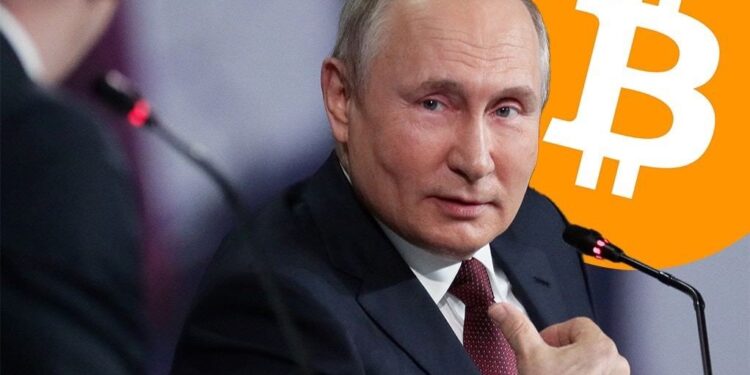Putin made a statement: The rise of Bitcoin is unstoppable, and the global financial landscape may b
 summary:
Putin made a statement: The rise of Bitcoin is unstoppable, and the global financial lands...
summary:
Putin made a statement: The rise of Bitcoin is unstoppable, and the global financial lands... Putin made a statement: The rise of Bitcoin is unstoppable, and the global financial landscape may be rewritten!
Russian President Putin’s Remarks Spark Global Interest in Cryptocurrency and Digital Finance
Russian President Vladimir Putin's recent speech at the Moscow Investment Forum has drawn significant attention from the global financial and technology sectors. He emphasized that the rise of Bitcoin and other cryptocurrencies is unstoppable, asserting that even if the dominance of the US dollar is challenged, this emerging technology will continue to progress and cannot be banned. Putin’s statements highlight not only Russia’s recognition of cryptocurrency technology but also the broader global shift towards a digitized and decentralized financial era.
Putin’s Stance and Russia’s Policy Shift
During the forum, Putin explicitly stated that no one can ban Bitcoin or other electronic payment tools, as they represent technological innovation. As global demand for reducing transaction costs and enhancing payment reliability grows, cryptocurrencies are transitioning from fringe technologies to mainstream applications. Russia’s policy adjustments further validate this trend.
Recently, Putin signed a new law classifying digital currencies as “property,” allowing their use in cross-border trade settlements. This move is seen as a strategic response to Western sanctions. Since the onset of the Russia-Ukraine conflict, Western economic sanctions have pushed Russia to explore alternative payment methods, with cryptocurrencies emerging as a critical tool to bypass restrictions. While cryptocurrencies are not yet permitted for domestic legal tender, their role in international transactions is rapidly expanding.
Russia’s Cryptocurrency Regulations and Digital Ruble Initiative
Russia’s digital asset policies are becoming more defined. In addition to allowing digital currencies for cross-border payments, the Russian Central Bank is actively developing the digital ruble. This state-backed digital currency is expected to officially launch by July 2025 and is currently in its testing phase. Since September 2023, the number of testers has grown from 600 to 9,000, and the initiative now involves 12 partner banks, expanding the trial’s scale. The digital ruble is seen as a cornerstone of Russia’s efforts to enhance financial sovereignty and international payment capabilities.
Differences Between the Digital Ruble and Cryptocurrencies
Although the digital ruble and decentralized cryptocurrencies like Bitcoin are both digital assets, they differ significantly in technical attributes and application scenarios. The digital ruble, issued by the Russian Central Bank, is a central bank digital currency (CBDC) that offers advantages in transaction security, efficiency, and state control. In contrast, decentralized currencies like Bitcoin operate without central authority, providing high transaction freedom but exhibiting substantial price volatility. These distinctions suggest that while Russia supports the digital ruble, it approaches cryptocurrencies with caution, mindful of their potential risks.
The Global Cryptocurrency Trend
Russia is not the only country actively exploring cryptocurrencies and digital currencies. Many nations are accelerating the development of digital financial infrastructure. For example, China’s digital yuan (e-CNY) is in its pilot phase, while the European Union is discussing the digitalization of the euro. These countries aim to boost financial innovation and reduce dependence on the traditional US dollar system.
Meanwhile, the decentralized nature of cryptocurrencies opens new possibilities for international cross-border payments. Leading platforms like Bitcoin and Ethereum are continuously upgrading their technologies to enhance transaction efficiency, reduce costs, and expand application scenarios. Institutions such as the International Monetary Fund (IMF) and the World Bank have also begun to recognize the potential of cryptocurrencies and are advocating for more robust regulatory frameworks.
Russia’s Economic Strategy and Future Prospects
In response to Western pressure, Russia is leveraging digital financial technologies to mitigate the economic impact of sanctions. Beyond the digital ruble and cryptocurrencies, Russia is actively pursuing “de-dollarization” settlement mechanisms with other economies, particularly within the BRICS coalition. Cryptocurrencies play a pivotal role in this effort, offering flexible cross-border payment options and reducing reliance on traditional international payment systems.
However, Russia faces significant challenges in advancing cryptocurrency legalization and launching the digital ruble. For instance, the high volatility and unpredictability of crypto markets could threaten economic stability. Additionally, establishing an effective regulatory framework to prevent money laundering and illegal transactions will be crucial in the coming years.
Tags: Bitcoin, cryptocurrency, digital ruble, cross-border payments, Russia

